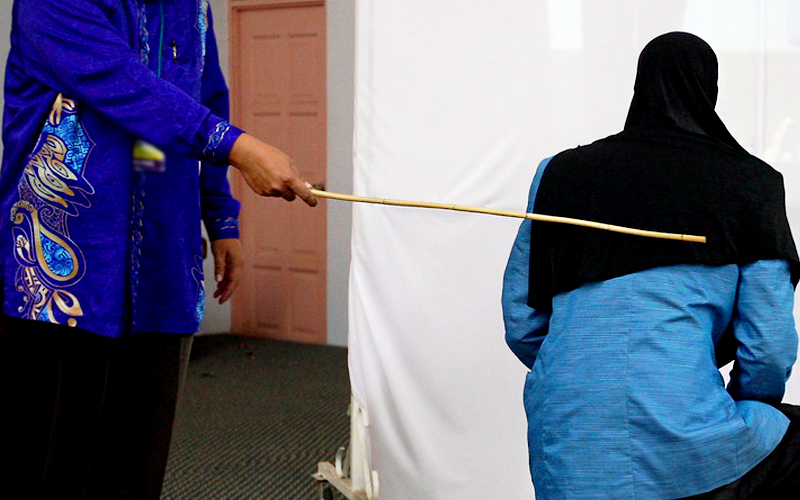Terengganu, under PAS rule, is again in the limelight for the wrong reasons. The recent public caning meted out to two women accused of attempting to commit a lesbian sexual activity (sihaq in Arabic) is uncalled for, and has brought criticism and caused ripples of unease across the country.
This caning has given a bad image to Islam and is going to derail any economic investments by foreigners in the state — one of the poorest in the country.
PAS clerics should be mindful that Islam provides Muslims with a code of behaviour, ethics and social values which helps them in tolerating and developing adaptive coping strategies to deal with offenders who have committed personal sins.
You may be interested
One of these is to show guidance, and not to punish or humiliate them in public. Offenders of this sort should be counselled as to what is allowed and what is prohibited in Islam and society.
When reproaching homosexual offenders, it would be more sensible if it is educative in nature.
Muslims claim that Islam is a religion that advocates dakwah (proselytising). First-time offenders therefore need counselling more than corporal punishment that could lead offenders to ostracise themselves from society.
Homosexuality is no doubt “sinful” in Islam as it is against the order of human nature. Human beings, as ordained, are created in pairs, each with certain physical and psychological characteristics to complement and complete one another and to accomplish certain roles.
One of their main biological roles is to procreate and develop society.
Cognitive failure and surroundings
Offenders can be subjected to counselling sessions and be advised that in Islam, as well as in many other religions, LGBT and homosexuality are considered as “distasteful” human traits.
Counselling is akin to dakwah and this would create more awareness among these offenders.
They should be humanely apprised of the negativity and that these mental and physical traits of theirs would create disorder in society as well as degrade a person and the family structure, and hence the society.
They should be led to the realisation that this detestable act is considered “sinful” in Islam, as the Quran says: “We had sent Lot when he said to his people, ‘Do you commit such immorality as no one has preceded you with from among the worlds? Indeed, you approach men with desire, instead of women. Rather, you are a people transgressing beyond bounds.” (7:80-81).
From the psychologist’s point of view, humans engaging in homosexual activities are considered an unnatural act. People usually have the urge to do so because of their cognitive failure and surroundings.
However, the tendency to become LGBTs and homosexuals can be attributed to many factors — genetic as well as the surroundings during puberty, among others.
Offenders can thus be referred to qualified counsellors or medical officers for advice.
This disorder, in reality, transcends race and religion and is found in all societies. There is at least one mention of lesbian behaviour in the extra-Quranic narrative: “Sihaq of women is zina (illegitimate sexual intercourse) among them.”
And since this act can be detrimental to the wellbeing of the people, courteous steps could be taken to discourage sexual activities among homosexuals.
However, no punishment on homosexuals is mentioned explicitly in the Quran, except that a curse will befall them or their society, as what is mentioned in the Quran: “And We rained upon them a rain [of stones]. Then see how the end of the criminals was.” (7:84)
Perhaps for this reason, religious clerics in the state of Terengganu applied the ta’zir provision of the shariah (refers to punishment for offences at the discretion of the judge or Qadi) on the female couple accused of sihaq. In this context, the punishment meted out was solely based on the discretion of the judge.
The judge could have felt that caning the accused in public and imposing a hefty fine on them would deter them and others from committing offences of this nature. Shockingly, there was no mention that the pair would first be counselled before imposing any form of punishment.
Neither was it mentioned that they would be called for counselling thereafter to rehabilitate them since they were first-time offenders.
Mental malaises can be considered a ‘malady’
PAS clerics should take heed of an Islamic narrative that “Allah has sent down a cure even as He has sent down the disease”.
Likewise, to the physicians, Muslims or otherwise, mental malaise can be considered a “malady” that has afflicted many into becoming LGBTs and homosexuals. Therefore, counselling them is still the best remedy.
Different studies have found that being truly religious increases a person’s faithfulness in the counselling process.
Religion can be considered to be one of the most important psychosocial factors in human life, and it’s imperative for Muslims to recognise how Islam can help prevent different mental disorders that has brought about unnatural sex among human beings.
In the past, Muslim scholars during the Persian civilisation, with the inspiration of Greek thinkers and logicians, have discussed the concept of psychology, psychiatry, psychotherapy and their relationship to mental health.
For instance, Ibn Sina observed mental disorders as conditions that were physiologically determined. Al-Razi considered mental disorders to be medical conditions, to be treated using psychotherapy and drug treatments.
He was the first Muslim physician who introduced methods of psychotherapy, and he had achieved a lot of success in discovering the definition and symptoms of mental health.
Psychotherapy was already widely used in treating mental disorders by progressive Muslim thinkers and philosophers of the past. There was even a mental ward in Baghdad, Iraq, in 705CE, established by al Razi.
Present day Muslim clerics, who are still in the dark, should thus take a cue from them and delve into the management of different human psychiatric or psychological disorders, as this is also an intrinsic part of the religion.
There have been many studies on exploring the impact of Islamic values on adaptation of a person’s cognitive errors, and how these Islamic values can help in prevention of different human psychological and physiological disorders.
Present-day judicious Muslim clerics could adopt several of these cognitive themes that could help to correct the cognitive errors among LGBTs and homosexuals.
Warped mentality of the feudal age
The recent caning of these two women in the state was supposedly done under the ta’zir provision of the shariah law. In other words, this has to do with human discretion and predilection, based on acceptable and non-acceptable moral precepts in a society.
If discretion is applied in ta’zir, the judge could also have considered other means of punishment since it was the offenders’ first-time misdemeanour and the possibility that they were misguided into behaving as such.
Unfortunately, the judge must have erroneously felt that by caning the offenders, he has fulfilled God’s law and earned His blessings. Little did he realise that offenders of this nature should be handled with mercy, as often pronounced in the many Quranic verses.
If PAS clerics feel that caning LGBT offenders can change their lifestyles, they are wide off the mark. Caning them in view of the public will only invite more resentment and criticism from the public.
The one crucial aspect that PAS clerics did not factor in is the process of rehabilitation that is intrinsic in all progressive societies.
Muslim clerics should therefore adopt a psychosocial model, based on Islamic counselling — the shariah path, as well as the contemporary approach to psychotherapy, where these people can seek assistance from qualified religious and medical personnel to deal with their mental and psychological snags.
Their main role for this purpose is to provide advice on social and mental health issues which would be in accordance with the Islamic and present-day moral principles. This form of counselling is more cultured than meting out harsh punishments for the public to have delight in, while humiliating the offenders.
PAS clerics should explore the impact of Islamic values and beliefs on modification of the offenders’ cognitive errors, and how these Islamic values can help in prevention of different psychological and physiological disorders.
Unfortunately, some zealous and perverted PAS clerics do not have the will as well as the know-how to do so. Many lack wisdom and are still having the warped mentality of the feudal age where harsh punishment was the only means for them to deter people from committing personal sins.
Moaz Nair is an FMT reader.
The views expressed are those of the author and do not necessarily reflect those of FMT.
This article originally appeared on freemalaysiatoday.com












